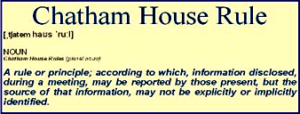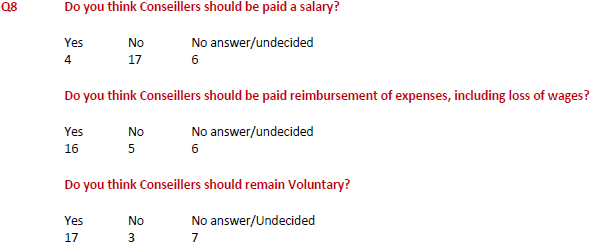Policy Development Group deliver on commitment to meet every month after each statutory Chief Pleas
June 10th 2022
The government’s Policy Development Group (PDG) met a few weeks ago for the second time this year; the previous meeting was held in February 2022, making this the fifth held under the chairmanship of Conseiller Frank Makepeace who was appointed to this position in February 2021. These meetings are not open to members of the public and the minutes are not published and, unlike other committee meetings, PDG meetings are conducted under ‘Chatham House Rule’. This means that anything discussed can be freely reported on by those present, provided the source of any statements or actions is undisclosed. This rule was first created in 1927 to allow people to speak freely, confident that they will not be identified and was designed to increase openness of discussion.
The PDG comprises of all sitting members of Chief Pleas and was originally constituted at the Michaelmas Chief Pleas in October 2014, with the intention of meeting once a month; this would mean that PDG closed meetings would gather three times as often as for each quarterly statutory Chief Pleas public meeting. However, over the previous two years, prior to Conseiller Makepeace’s tenure as chair of the group, the PDG failed to meet anywhere near as frequently as initially planned; in fact, in 2020 the PDG group met only once!
All Chief Pleas committee meetings minutes remain unavailable to the public; the only source of government update is when Chief Pleas publishes a press release or if a matter is to be brought before the House for debate. However, with the Editor of this publication becoming a
Conseiller early last year, and with it a Policy Development Group member, the public, through this publication, now have valuable insights into what goes on behind the closed doors of a PDG meeting.
Over 80% of Chief Pleas members were in attendance at the most recent PDG with many points being revisited from the minutes of the previous meeting earlier this year. These included the possibility of a regular civil service audit – with guidelines to be discussed further.
The matter of the Seigneur’s stipend is also ongoing; the stipend was first introduced in 2007 as recompense for the withdrawal of the Congé and Treizième. The replacement stipend allowance is specifically outlined within ‘The Real Property (Transfer Tax, Charging and Related Provisions) (Sark) Law, 2007’ and is index-linked – 15 years later and RPI (Retail Price Index) increases have caused a rise of 35%. This has taken the stipend from £28,000 in 2007 to more than £38,000 today. It was insisted from some quarters that an evidence-based case will be essential if any changes to this facet of the reform laws are to take place. Concerns were voiced as to the dangers of reneging on a deal that had been agreed in good faith between Chief Pleas and the previous Seigneur, Michael Beaumont. These were countered by several members demanding to know just what Sark gets for its money. Law Officers are now to be approached regarding the legality of a proposal to remove the Seigneur’s stipend.
Reflections on the previous meeting’s minutes continued with clarification being sought on the position of a Conseiller asking a question at Chief Pleas not related to the business of the day on behalf of a member of the public. It was confirmed that any question has to be submitted to the Speaker before the Chief Pleas meeting concerned.
The formation of an independent scrutiny panel for the Policy & Finance Committee (P&F) was again discussed. This publication has made its position clear: the benchmark of scrutiny for Sark’s government and civil service should be that no one gets to mark their own homework. Not withstanding the lack of effective communication, Chief Pleas, and particularly the Policy & Finance Committee as the Island legislature’s principal policymaking body, should be scrutinised. Recent items brought before Sark’s government that might not have withstood scrutiny may have included Chief Pleas’ attempt to remove the board of directors of the Isle of Sark Shipping Company Ltd (IoSS), the compulsory purchase of Sark Electricity Ltd (SEL), and the introduction of the aforementioned Civil Service Code of Conduct. The IoSS matter in August 2020 saw the Chief Pleas reports and relevant information only being released a few hours before Conseillers were expected to vote on the propositions. The compulsory purchase of SEL resulted again in an Extraordinary meeting of Chief Pleas being announced, only three days before it was due to take place, with the following statement, ‘copies of the Report will be distributed immediately before the meeting.’ Almost a year later, there remains very little information in the public domain surrounding any possible purchase of SEL, either by negotiation or compulsorily. The Civil Service Code of Conduct appeared, ultra vires, on the Chief Pleas website in August 2021; Policy & Finance retrospectively sought the approval of the House two months after its publication.
It has previously been stated at a meeting of Chief Pleas by the chair of P&F that the committee are in discussion with their Guernsey counterparts regarding a combined scrutiny function, various provisions were still discussed at the PDG; what should be scrutinised and should it come from on or off Island. The civil service is to search for a detailed document regarding a scrutiny panel which is believed to be in existence – you may have thought that this might have already been done as a scrutiny function has been discussed for many years now. Independent scrutiny of Sark’s government as a whole, not just P&F was discussed later in the meeting with agreement that it could conceivably be brought before the House by two ‘back benchers’ in what would, in effect, be a ‘Private Member’s Bill’.
An update on the recent census was discussed – there is no official deadline for returns, however, when the Registrar last updated the committee, there were 50 forms outstanding. Enumerators have been asked to return to outstanding properties to resolve the situation.
A dentist from a practice in Guernsey has shown interest in providing a service on Sark with further discussions ongoing.
A request from the public to reinstate the ‘Securing Sark’s Future’ reports that ceased several years ago was revisited. It was said that, with the recent appointment of an Assistant Chief Secretary, the Island’s administration office would have more capacity to address this matter. It was agreed that the admin office should prioritise improving public engagement and that a communications policy would be helpful.
Moving on to the Business of the Day, complaints from the public surrounding the burning at the Quarry and the subsequent smoke pollution were debated. The Douzaine are responsible for these issues and are looking at purchasing a new incinerator and more recycling. However, with regard to the suggestion that the incinerator be moved away from the bottom of the Harbour Hill and over to Les Laches alongside the Island’s sewage treatment plant, it was insinuated that the public were not receptive to this.
The spaying of bitches, possible licences for the breeding of dogs and dangerous dog legislation were discussed and are to be reviewed by the Agriculture, Environment & Sea Fisheries Committee.
Conseiller remuneration was discussed with potential recompense for loss of earnings being mentioned – P&F is to investigate further. The prospect of salaried politicians was pretty much universally dismissed out of hand, but a significant body of support was behind the idea of recompensing Chief Pleas members who had no choice other than to take a few hours or a day or two off work to, for instance, attend meetings in Guernsey on behalf of the Island.
A reduction of Sark’s voting age to 16 is to be considered. This would also include lowering the age for standing as Conseiller to 16. Guernsey and Jersey’s voting age is currently 16, with Alderney in the process of amending its own voting age from 18 to 16.
It was confirmed that Sébastien Moerman had been appointed chair of the Isle of Sark Shipping (IoSS) board whilst Jeremy LaTrobe-Bateman has been appointed as a Sark-based Non-Executive Director (NED). The remaining Guernsey-based NED roles are yet to be finalised.
Conseillers confirmed that various government committees have differing methods of operating committee meetings. It was suggested that meetings should be attended by its dedicated Committee Support Officer (CSO), whilst the Education, Medical & Emergency Services, and P&F should also be attended by the Chief Secretary/ Assistant Chief Secretary as standard procedure. The publication of minutes of committee meetings was not discussed despite evidence of a growing public demand for such a move.
This article first appeared in the Sark Newspaper : June 10th 2022



